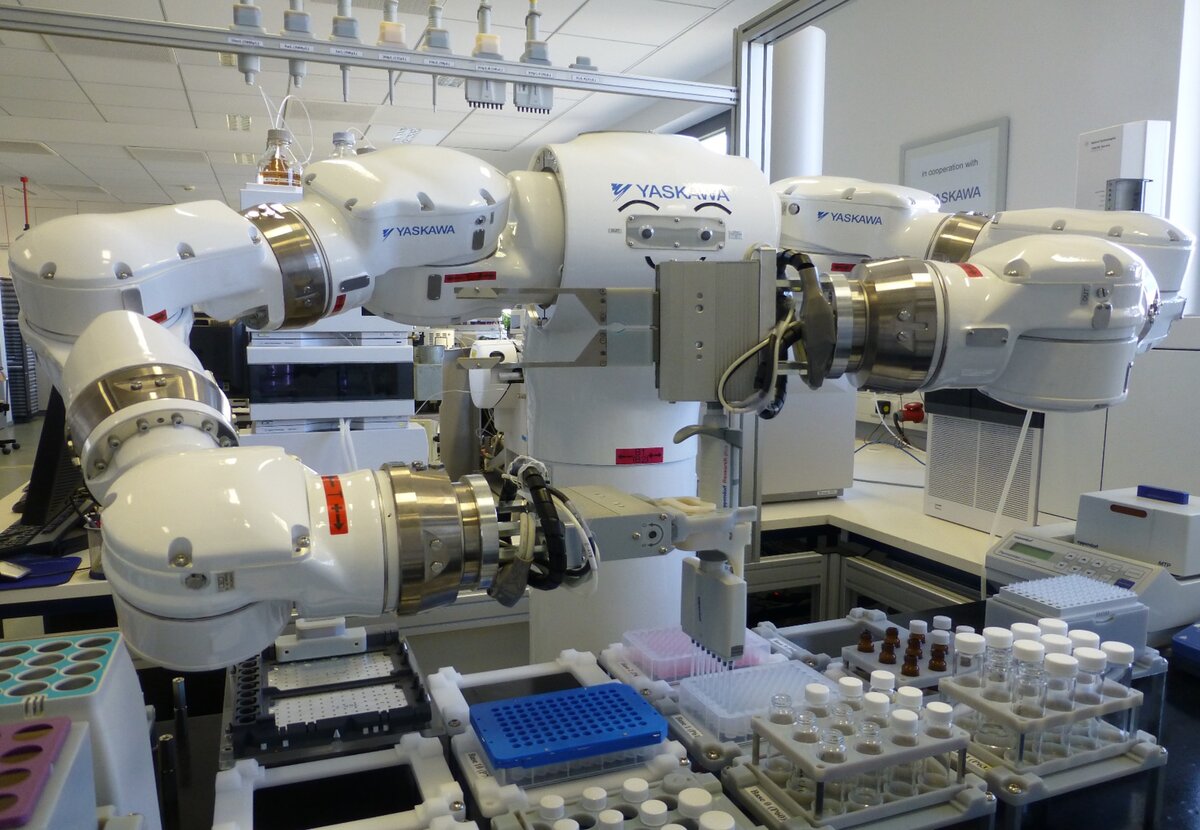Robot-based laboratory automation at CELISCA
The Center for Life Science Automation (CELISCA) at the University of Rostock and Yaskawa have agreed to continue their cooperation in the development of robot-based solutions for laboratory automation. As one of the first European users ever, the institution will also employ a robot model of the new Motoman HD series, specially developed for life science applications.
- Industrije
- Laboratorijska avtomatizacija
- Aplikacije
- Material Handling
- Stranka
- CELISCA / University of Rostock
- Izdelki
- HD Series
- CSDA10F - SDA - serije
Since 2015, the Center for Life Science Automation (CELISCA) of the University of Rostock has been using a MOTOMAN CSDA10F dual-arm robot with a load capacity of 10 kg and a range of 895 mm (per arm). Yaskawa had presented the robot in Europe a year earlier, in 2014, and provided CELISCA with a unit as a permanent loan. Numerous research projects and scientific publications on the topic of robot-based laboratory automation have since resulted from this cooperation.
“As a research institute, we need a flexible system for many applications in the laboratory, with a certain load capacity,” explained Prof. Dr.-Ing. habil. Kerstin Thurow, Chair of Automation Technology / Life Science Automation and CEO of CELISCA, in justification of the decision in favour of this model. In the meantime, however, robotics has naturally evolved, says Thurow.

Picture: Yaskawa’s Motoman CSDA10F robot employed in automated sample preparation. The robot uses classic multi-pipettes from manual laboratory work (source: CELISCA)
Robots for hygiene-relevant areas
For this purpose, Yaskawa’s new hygienic design robot MOTOMAN HD8 will be made available to CELISCA. Here it will be used in an EU-funded synergy project for sample handling in crystallization processes in materials research as a fully automated system in which humans no longer intervene.
The MOTOMAN HD8 meets the stringent requirements of laboratory and ISO cleanroom environments. This allows it to take on a variety of handling tasks in hygiene-relevant areas of laboratory automation, the pharmaceutical industry or the food industry.
Focus on sample preparation
One focus of their research in the field of robot-based laboratory automation is on sample preparation, for example on activities and processes such as pipetting or the opening and closing of screw caps. These are typically highly repetitive tasks that require very high repeat accuracy.
“Such tasks are relatively boring for a human being, and also ergonomically exhausting,” Professor Thurow summarizes. “If these steps are automated, the laboratory employees are freed up for cognitive processes.” And the expert adds one more aspect: “Only through automated processes in the laboratory can research results actually be standardized and compared”.
Starting points for the future
CELISCA sees new interesting starting points for the future in the automation of applications that are so far difficult to automate, as well as in the development and use of standardized interfaces, as offered by the new Motoman HD8. “Automation must be of interest to the end customer,” explains Professor Thurow. “In recent years, robot systems for laboratory automation have become more affordable and thus more attractive for more and more users. Yaskawa’s systems are very reliable, because they come from the industrial sector, and at the same time provide excellent support.” Finally, according to Prof. Thurow, automation can also inspire the – mostly tech-savvy – young people in the life-science industry, which would help to counteract the acute shortage of skilled workers.”
Picture: Hygienic Design Robot MOTOMAN HD8
The Center for Life Science Automation, CELISCA
The Center for Life Science Automation (CELISCA), managed by Prof. Dr.-Ing. habil. Kerstin Thurow, is a central scientific institution of the University of Rostock (pursuant to Section 94 LHG M-V) and has been performing research into highly automated processes in the field of life sciences including medicine since 2003. Future-oriented work includes innovative automation concepts and the use of mobile robots in the laboratory. The research work of CELISCA is interdisciplinary and internationally oriented at the interface of engineering, medicine and natural sciences. In October 2024, CELISCA celebrates its 25th anniversary in Rostock.
Contact for readers’ enquiries:
Tel.: +49-8166-90-0
robotics@yaskawa.eu
Contact for the press:
Marion Annutsch
Marketing / PR / Communications
Yaskawa Europe GmbH
Tel.: +49-8166-90-0
marion.annutsch@yaskawa.eu
www.yaskawa.eu.com






















